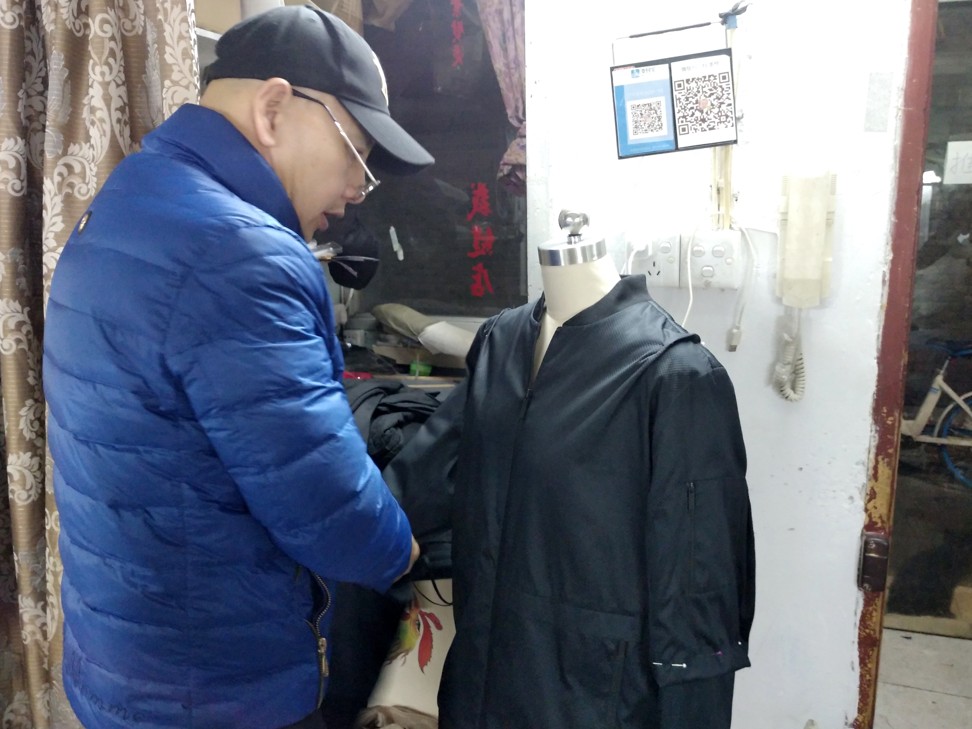
Meet the Chinese tailor who has luxury clothing alterations all sewn up
- Shi Guomin has been altering clothes for Hangzhou’s best dressed since the 1980s
- Well-known tailor helps customers create a personal style through modifying their wardrobe
In an old workshop in Hangzhou, a city in eastern China, the labels of luxury brand names like Chanel and Burberry distinguish the clothing that hangs from the racks above the sewing machines scattered around a 20 square metre (215 square foot) room.
Many shops in China – and particularly in the south – are known for producing fake designer garments that resemble these – part of China’s notoriety as a maker of counterfeit goods.
But the items that hang in the Wulin Road shop are no spurious copies. They are the real deal: genuine big brand name jackets, pants, scarves and other items that have been brought to Shi Guomin for altering to better fit their owners.
Shi, who has been altering clothes for some of Hangzhou’s best dressed since the 1980s, has become a well-known specialist in adjusting, modifying and reshaping luxury clothing.
He has altered branded clothing worth hundreds of millions of yuan over the years, as more people buy luxury brands in Hangzhou, the capital of Zhejiang province.
More than 30 items a day, of which 70 per cent are luxury brands, are altered in the modest workshop called “Fatty’s Workroom”, after a nickname for its owner.
Here Shi, 62, and his five employees work their magic and help customers create a personal style.
“There are more people who want to be different,” Shi said. “They often would ask to add a personal touch” to the garment in addition to having it made to fit them perfectly.
China’s senior models in demand as fashion labels woo ‘silver spenders’
Among the quirky demands: transforming a man’s leather coat into a woman’s, or making a scarf into a hat.
The most expensive item Shi ever altered was a crocodile leather jacket that had cost the owner more than 500,000 yuan (US$73,800). He charged 100 yuan to change the lining, he said.
No matter how much an owner may have spent on an item, Shi charges by the hour – between 50 and 60 yuan.
“It usually takes three to four hours to finish a difficult job, say, making a suit fit more properly across the shoulders,” he said. “Often customers pay about 200 yuan for such an adjustment.”
Shi learned sewing from an old tailor so he could make extra money while working as a technician in a factory in the late 1970s.
“Private business was still banned at that time,” he recalled of the period before China’s opening up to the West had allowed local entrepreneurs to start businesses.
“So I worked in the factory in the day and sewed clothes at home at night.”
In 1984, fashion shops started popping up along Dongpo Road in bustling central Hangzhou, near Wulin Road. Shi – seeing there would be a need for a clothes alteration service – plunged into the business full-time from a relative’s workshop on Wulin.
The carpenter lovingly repairing old Shanghai’s historical buildings
China’s then emerging luxury clothing market gave him plenty of work.
“There were no Gucci or Dior then, but what were offered in those shops were also deemed the best ones local residents can have,” Shi said.
“They came from Hong Kong and South Korea. Sometimes people may not be able to find their best size, but when they really like it, they would buy it anyway and seek help from us [to make it fit],” he said.
Shi opened his own shop in 1995 as his reputation among high-end consumers was growing. By then, Hangzhou had opened Hangzhou Mansion, the city’s first luxury shopping centre.
“The first luxury piece I altered was a Prada coat, priced at over 6,000 yuan,” he said. “I was really shocked. Because at that time, a coat priced at 300 yuan would already be considered very expensive for most people.”
The eco-fighter who tackles the scourge of rubbish on China’s beaches
Although he has worked on luxury clothing for more than 20 years, Shi said he had never bought any himself.
Despite his skills, he has made mistakes. He once gave a customer 6,000 yuan as compensation after damaging a Celine silk dress. “[It] might have caught on something sharp while being altered in my shop,” he said.
He intends to keep working, as long as his health allows.
“This is hard work, but I think people still need it,” he said.


